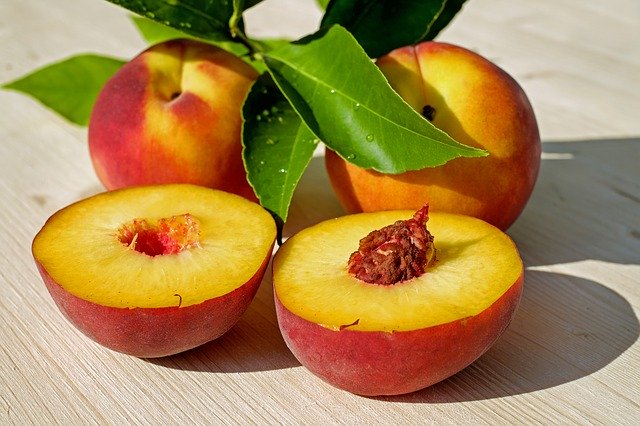Can dogs have peaches? It is a question that we are bound to ask due to the vast diversity between our digestive system and dogs!
Due to their carnivorous nature, dogs could enjoy a slice of meat, a bite of fish, some vegetables, or even a rice plate. On the other hand, fruits are not considered a primary source of nutrition for dogs, nor do they need them as a part of their daily diet.
While eating peaches could be a great source of pleasure, especially during summer, you might need to hold back a little and read today’s article before splitting this delicious peach with your doggy.
But, before we answer the question, can dogs have peaches? Let’s discuss some information about peaches quickly!

Table of Contents
Peaches, The Red Powerful Source Of Nutritients
6000 years B.C. is when peach was domesticated for the first time, the cultivation wasn’t started till 2000 years B.C. in China. In 2018 nearly 25 million tonnes of peach were produced globally, in which China was the most significant contributor with more than 15 million tonnes.
Peaches come in many types, and the main four are yellow peaches, white peaches, donut peaches, and nectarines.
According to a report done back in 2018, the average U.S. citizen consumes about 2.2 pounds of peach, which quite frankly a lot to be eaten by one person, your dog deserves a share too, and here we will find out whether he should get it or not. So, can dogs have peaches?


Can Dogs Have Peaches? The Answer!
Although it’s not their primary meal, it’s OK to share some of this pleasurable fruit with your dogs but in moderation, and here we learn why.
With different amounts of vitamin C, vitamin A, Potassium, Vitamin E, Vitamin K, Copper, Manganese, Fiber, Carbs, Fat and more, peaches are considered a significant source of beneficial nutrients.
- A Great Way For Boosting Digestive System
The significant amounts of insoluble fiber present in peaches contribute largely to more stable and healthier digestion by adding bulk to your dog’s stool, helping in the movement of food to your dog’s gut.
- A Great Way To Protect Your Dog’s Skin
The compounds present in peaches were found to provide exceptional protection to the skin; they could also help retain moisture. According to many recent studies, there is also a related link between the nutrients present in peaches and the prevention of U.V. damage.

- Lower Risk Of Cancer
Antioxidants like carotenoids and caffeic acid carry anti-cancer properties. The skin and flesh of peaches are excellent sources for such compounds. Adding to that, the reduction to cancer growth by other types of antioxidants such as polyphenols found a lot in peaches.
- A Healthier Heart
Heart issues generally result from one of two reasons: high blood pressure, or high cholesterol levels.
The liver produces compounds called bile acids from cholesterol. Peaches could easily bind with these compounds to be then excreted through feces with the cholesterol they contain. That’s how peach contributes to lower cholesterol levels.
- Good For The Immune System
Vitamin C present in peaches is essential for the functionality of immune cells. Peaches also have a role in keeping germs out of the body by strengthening the mucus membranes using their vast amounts of vitamin A.
- More Peaches, Healthier Brain
Red and white blood cells in the bone marrow of the brain are produced by compounds called B-vitamins, and especially a product known as Folate, which we find a lot in peaches.


Why Your Dog Shouldn’t Have Too Many Peaches?
Indeed we answer the question, can dogs have peaches with Yes. However, giving your dog many peaches will increase risks to specific health problems. As we mentioned before, peaches are not a natural food for dogs. The following some downsides for peaches if your dog overeats peaches!
- The Possibility Of Hyperkalemia (Increase Potassium Levels In Blood)
The potassium present in peaches could result in a major drop in blood pressure if consumed without proper moderation. Increased potassium levels in the blood can cause many other problems related to the heart.
- Bad For Dogs’ Skin
In moderation, peaches are a great source that provides the skin with the proper hydration it needs to look shiny and fresh. However, the more peaches your dog consumes, the more hydrated he will be, and the balance will soon be lost, causing skin problems.
- More Vitamin A Isn’t What You Want For Your Doggy
Like many other useful nutrients, vitamin A is essential for the dog’s body and comes with a wide range of benefits, but more consumption won’t necessarily result in more benefits.
On the contrary, several results have shown that there are many problems related to the overconsumption of vitamin A, many of which are intestine related ones, like stomach discomfort, loss of appetite, vomiting, nausea, and others like fatigue and excessive sweating. You don’t want that for your dog.

A Safe Way To Serve Peaches To Your Dog
Peaches indeed are an excellent fruit for both human and pets if eaten in moderation. It is not a matter of asking questions like can dogs have peaches but instead asking questions such as whether it is safe to feed your dog these fruits.
- Moderation Is The Key
Your dog could enjoy peaches, but don’t let him get used to it. Keep peaches as a treat for the dog that can enjoy it every then and now, like that you will make sure to keep your dog both healthy and safe.
- Proper Observation Is Required
It would be best if you observed the peaches before delivering it. Thus you could eliminate the possible hazards made by chemicals in their skin, which means, nowadays, more and more of our food is becoming less natural as they keep adding different chemicals to grow them faster to fulfill the enormous demand. These chemicals are bad for both our dogs and us. But, your dog’s body is sensitive, and such things may cause problems.
If you have more information about peaches for dogs, please write them down below in the comment section. So, every cat owner benefits from that.
You’ll Also Love These Posts:
Studies have shown if you like this blog article — you will also love the following posts.

